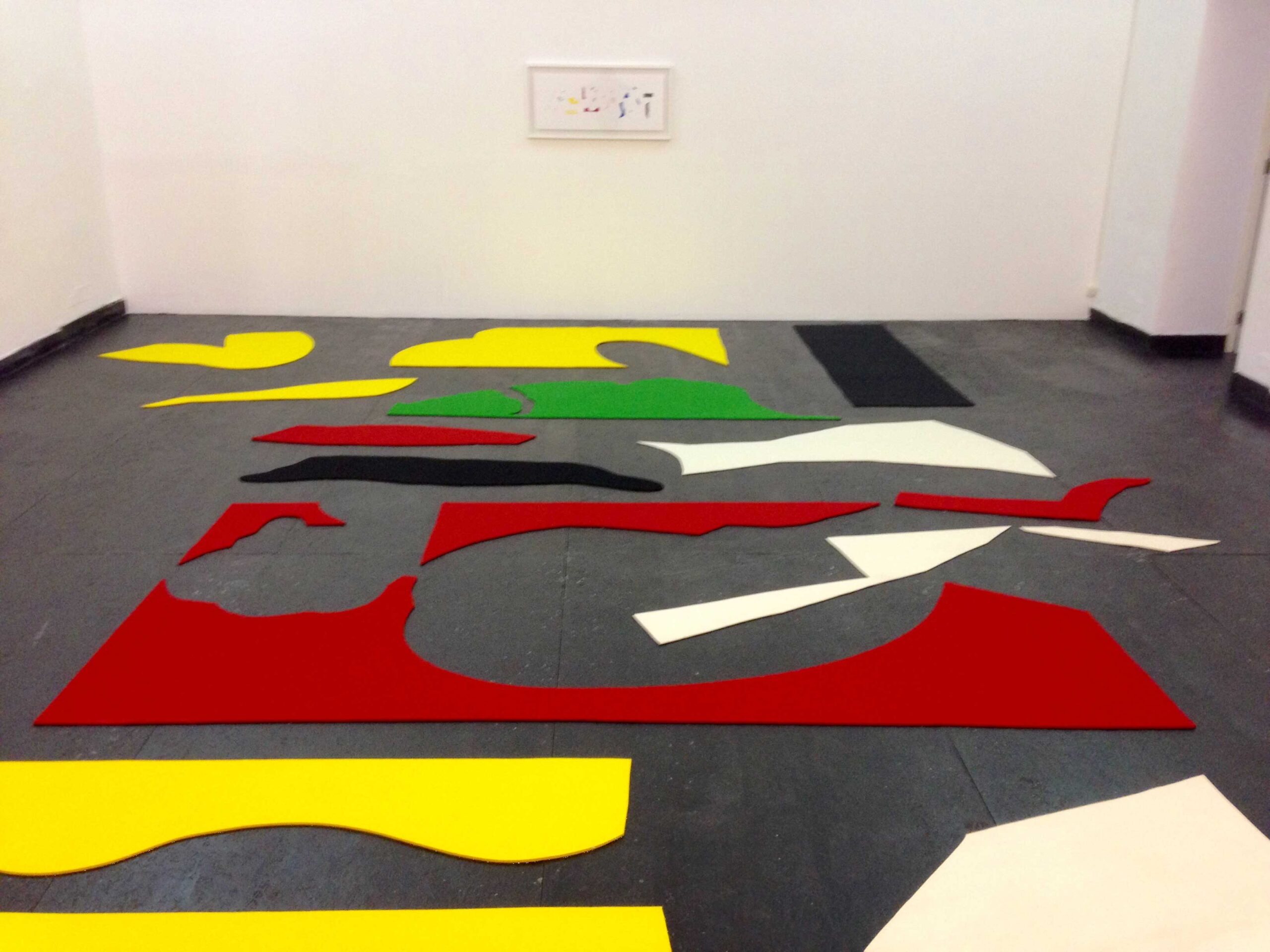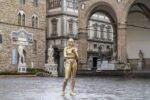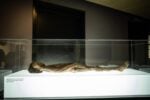Pinksummer goes to Rome – Cesare Viel / Luca Vitone

La doppia personale di Cesare Viel e Luca Vitone da pinksummer goes to Rome, tratta di deformazione e ricomposizione e forse anche di scompaginazione e riscrittura, muovendo dall’ineludibile principio d’ immanenza dell’opera d’arte. La trasformazione della forma nel caso specifico appare spinta dal desiderio di esplorare altre, delle diverse possibilità che l’attitudine e le forme, per forza devono rilasciare.
Comunicato stampa
La doppia personale di Cesare Viel e Luca Vitone da pinksummer goes to Rome, tratta di deformazione e ricomposizione e forse anche di scompaginazione e riscrittura, muovendo dall’ineludibile principio d’ immanenza dell’opera d’arte. La trasformazione della forma nel caso specifico appare spinta dal desiderio di esplorare altre, delle diverse possibilità che l’attitudine e le forme, per forza devono rilasciare.
La mostra in qualche modo fa pensare all’arte del recupero e alla cucina degli avanzi della tradizione ligure e genovese. Al contrario di quanto si immagina la cucina degli avanzi non era solo appannaggio delle classi povere attente a far quadrare le proprie risorse. Nelle casate aristocratiche vigeva il detto “un buon pasto dura tre giorni”. Anche a Genova il cibo veniva usato per stupire, mostrando attraverso le tavole imbandite averi e potere. Più il pasto era ricco di portate, più avanzi rimanevano. E pertanto in una terra per cui lo spreco, al di là della classe sociale, è tradizionalmente inconcepibile, cuochi e massaie si destreggiavano con gli avanzi tirando fuori pietanze speciali.
Cesare Viel e Luca Vitone, il cui percorso procede parallelo da circa un trentennio e per parallelo s’intende citando Viel alla lettera “ una profonda condivisione di punti di partenza che sono campo vivo di dinamiche, una sorta di riconoscimento da lessico familiare, come sentire suoni e segni linguistici esistenziali dentro a una grotta, al buio e riconoscersi d’istinto, con segnali prelinguistici emozionali”, presenteranno una mostra fluida e mutaforme, muovendo da opere pre-esistenti.
Cesare Viel ritorna per la mostra romana sui feltri tratti dalle figure e dagli sfondi dell’opera matissiana, gli stessi che in “Infinita Ricomposizione”, l’ultima personale dell’artista da pinksummer a Genova, erano usati come materiale performativo, per saturare lo spazio, lo sfondo reale della mostra, con una dinamica serrata, come sopraffatta dall’ultra-colore di Matisse. Tuttavia se il lavoro di Viel contiene una tensione verso l’assoluto, per l’artista l’assoluto assume sempre i connotati del relativismo, un relativismo che prima di essere culturale è etico traducendosi nel rifiuto, che contraddistingue tutta la sua opera, di qualsivoglia determinismo assiomatico e gerarchico implicito nella fissità, fosse anche quella del genere.
A Roma i feltri hanno un ritmo autonomo e indipendente, presentandosi pre-ordinati in soffici mobiles fluttuanti nell’aria, come “Apparati del Buon Umore”. Opere tattili per il “toucher actif”.
Luca Vitone presenterà due dei tre “scompaginamenti spaziali”, come dispiegamento in successione del processo che ha condotto alla realizzazione di un libro, che l’intenzione avrebbe voluto essere altro, ma che la circostanza ha fatto implodere in un diario di sentore beckettiano. Dove l’eventuale fallimento registrato in “Effemeride Prini”, pubblicato da Quodlibet, non appare poi tanto accidentale, considerando che la scommessa, rispetto alla residenza a Roma all’American Academy, avvenuta nel 2008, era quella di “fotocopiare la voce” di Emilio Prini. Un pianeta, la cui posizione, si sa, è sempre stata remota e sfuggente. Tuttavia è proprio la maniera con cui Vitone si destreggia con l’idea di fallimento che rende questo libro speciale. A differenza dei personaggi di Beckett, Vitone non gira come un criceto nella ruota, conferendo al vuoto, ammesso che esista, una sorta di cornice, che in altri tempi, avrebbe potuto avere la valenza positiva dell’ozio, atto a trasformare l’attesa chimerica in contemplazione produttiva.
Ogni pagina, presenta in alto una data strappata, nei giorni, da tre diversi quotidiani, mentre in fondo, a chiusura di giornata vengono nominati i piatti prelibati della cuoca dell’American Academy, accompagnati dall’accostamento appropriato del vino servito. I dialoghi al centro della pagina, trasformano via via Prini nella creatura leggendaria di un mito sull’origine.
Viel dal canto suo, aveva già ricondotto altrove Henri Matisse, l’altro grande assente della mostra, alla sua personale primeva origine.
La mostra s’intitola: “Cesare Viel e Luca Vitone. Ab urbe Genoa duo lykanthropi Romae”, tanto per richiamare in modo celato, il pop e l’orrore di quegli anni ’80 in cui Cesare Viel e Luca Vitone, assieme, fecero la loro prima mostra.
Via del Vantaggio 17/A 00186 Roma
Orario al pubblico dal martedì al sabato, dalle 15.00 alle 19.30.
La mostra chiuderà il 16 Giugno 2017
Pinksummer Palazzo Ducale-Cortile Maggiore Piazza Matteotti 28r 16123 Genova Italy
t/f +39 010 2543762 [email protected]; pinksummer.com
scarica il comunicato stampa qui
CESARE VIEL – LUCA VITONE
Ab urbe Genua duo lykanthropi Romae
Opening May 15th 2017, h 6.30 p.m.
Press release
Cesare Viel and Luca Vitone double solo show at pinksummer goes to Rome is about deforming and recomposing, maybe also about messing up pages and rewriting, and moves from the artwork ineludible principle of immanence. On this specific occasion, the transformation of form seems propelled by the desire to explore further the diversity of the possibilities necessarily restricted by attitude and forms.
Somehow the exhibition recalls the art of recycling and the leftover cooking typical of Ligurian and Genoese tradition. Contrary to what one might image, leftover cooking was not only common among poor social classes, attempting to efficiently use their resources. As a matter of fact, the saying " a good meal last three days" ruled among aristocratic lineages too. In Genoa, like elsewhere, food was used to impress by displaying opulence and power on the table. The more courses had the meal, the more leftover were left. Therefore, in a land were wasting is traditionally inconceivable among any social class, cooks and housewives found their way to get special dishes from leftover.
Cesar Viel and Luca Vitone, which paths run parallel since approximately thirties years, and by parallel we mean, verbatim quoting Viel, " deeply sharing same starting points that are living field of dynamics, some sort of recognised family lexicon, like hearing sounds and existential linguistic signs inside a cave, in the darkness and to recognize each other, through those emotional prelinguistic signs”, will present a fluid and transforming exhibition by moving from pre-exhistent works.
For his exhibition in Rome, Cesar Viel goes back to the felts, drawn from some Matisse figures and backgrounds, that he used as performance props for "Infinita Ricomposizione", the most recent solo show of the artist at pinksummer in Genoa, in which they saturated the space, the actual background of the exhibition, through an intense dynamics almost conquered by Matisse ultra-color. However, even though the work of Viel contains a tension towards the absolute, to the artist the absolute always assumes the features of relativism, a relativism that before being cultural is ethical and turns itself in a distinguishing mark of all his work, the refusal of any axiomatic and hierarchical determinism implicit in fixity, even just in the gender one.
In Rome felts assume an autonomous and independent rhythm and appear as previously ordered soft mobiles fluctuating in the air, some “Apparati del Buon Umore” (Happiness Devices). Tactile works for a “toucher actif” (active touching).
Luca Vitone will present two out of three “spatial page displacement”, like a sequential deployment of the process that has determined the making of a book, that according to the original intention was meant to be another thing but that circumstance made implode into a diary of Beckettian flavour. After all, the eventual failure recorded in “Effemeride Prini” puiblished by Quodlibet does not appear so accidental if one considers that the challenge of the artistist in residence at the American Academy of Rome in 2008 was “to photocopy the voice” of Emilio Prini. A planet which position, we know, has always been remote and fleeting. However, the way Vitone plays with the idea of failure is just what does make this book so special. Unlike Beckett's characters, Vitone does not spin his wheel like a hamster by conferring to the void, given that it exists, some sort of frame, which in another time could have had the positive value of idleness that turns the chimerical wait in a productive contemplation.
On top of every page, there is a date ripped off on a daily basis from three different newspapers, while in the bottom, at the end of the day, there are the delicious dishes prepared by the cook of the American Academy, accompanied by the appropriate combination with the wine served. The dialogs in the center of the page, gradually transform Prini in the legendary creature of a creation myth.
Viel himself had already taken Henri Matisse, the other great absent in the exhibition, somewhere else, to his personal primeval origin.
The exhibition is called “Cesar Viel and Luca Vitone. Ab Genoa city pair lykanthropi Romae”, just to recall POP and horror subculture of those 80ies in which Cesare Viel and Luca Vitone, together, had their first exhibition.



